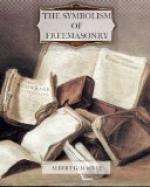The aspirant enters on this search after truth, as an Entered Apprentice, in darkness, seeking for light—the light of wisdom, the light of truth, the light symbolized by the Word. For this important task, upon which he starts forth gropingly, falteringly, doubtingly, in want and in weakness, he is prepared by a purification of the heart, and is invested with a first substitute for the true Word, which, like the pillar that went before the Israelites in the wilderness, is to guide him onwards in his weary journey. He is directed to take, as a staff and scrip for his journey, all those virtues which expand the heart and dignify the soul. Secrecy, obedience, humility, trust in God, purity of conscience, economy of time, are all inculcated by impressive types and symbols, which connect the first degree with the period of youth.
And then, next in the degree of Fellow Craft, he fairly enters upon his journey. Youth has now passed, and manhood has come on. New duties and increased obligations press upon the individual. The thinking and working stage of life is here symbolized. Science is to be cultivated; wisdom is to be acquired; the lost Word—divine truth—is still to be sought for. But even yet it is not to be found.
And now the Master Mason comes, with all the symbolism around him of old age—trials, sufferings, death. And here, too, the aspirant, pressing onward, always onward, still cries aloud for “light, more light.” The search is almost over, but the lesson, humiliating to human nature, is to be taught, that in this life—gloomy and dark, earthly and carnal—pure truth has no abiding place; and contented with a substitute, and to that second temple of eternal life, for that true Word, that divine Truth, which will teach us all that we shall ever learn of God and his emanation, the human soul.
So, the Master Mason, receiving this substitute for the lost Word, waits with patience for the time when it shall be found, and perfect wisdom shall be attained.
But, work as we will, this symbolic Word—this knowledge of divine Truth—is never thoroughly attained in this life, or in its symbol, the Master Mason’s lodge. The corruptions of mortality, which encumber and cloud the human intellect, hide it, as with a thick veil, from mortal eyes. It is only, as I have just said, beyond the tomb, and when released from the earthly burden of life, that man is capable of fully receiving and appreciating the revelation. Hence, then, when we speak of the recovery of the Word, in that higher degree which is a supplement to Ancient Craft Masonry, we intimate that that sublime portion of the masonic system is a symbolic representation of the state after death. For it is only after the decay and fall of this temple of life, which, as masons, we have been building, that from its ruins, deep beneath its foundations, and in the profound abyss of the grave, we find that divine truth, in the search for which life was spent, if not in vain, at least without success, and the mystic key to which death only could supply.




